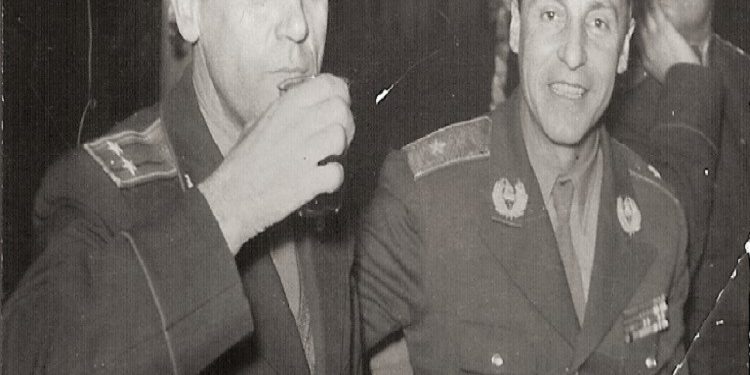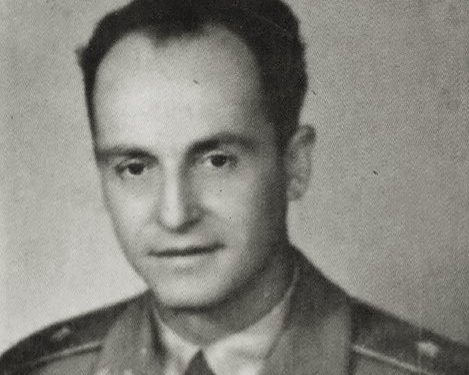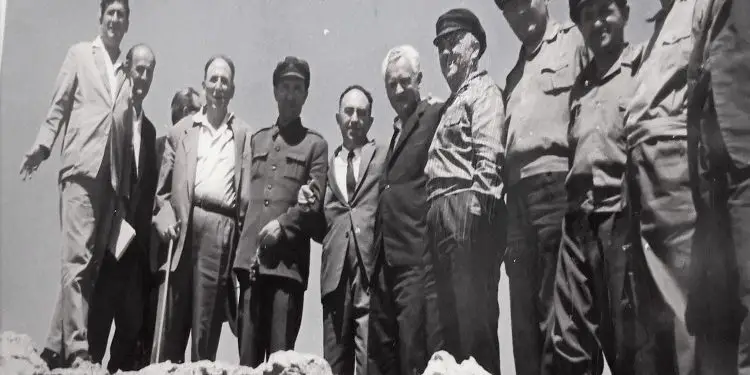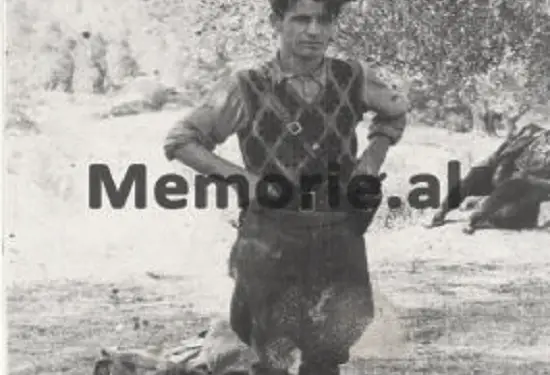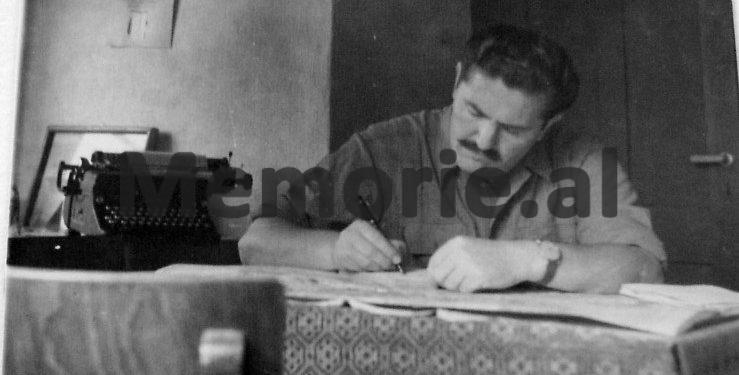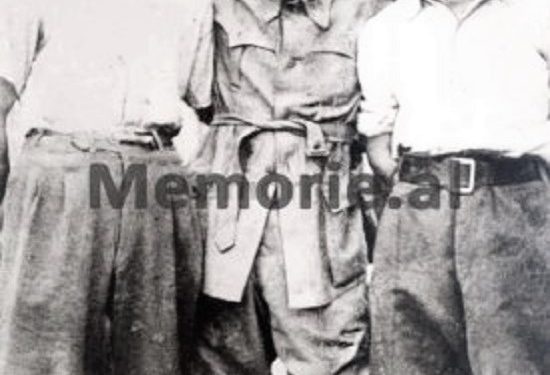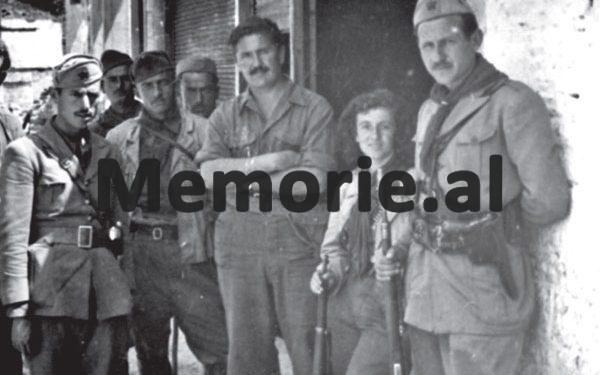-A book about the criminal activity of Hoxha…!-
Second part
Memorie.al / In his book “Prapaskenat kobzeza e Enver Hoxha”, published in 2008, Major General Ernest Jakova makes a scan of all the criminal activity of the dictator Enver Hoxha, both during the years of the War and after, with his installation of one of the harshest dictatorships. For the post-war period, the author mainly stops and analyzes the situation in the Army and behind the scenes in the Ministry of Defense. His book, as a close witness in many affected events, is a valuable reference for researchers, while for readers; it is worth returning attention to this book, especially these times, when thoughts are being articulated for a rehabilitation of the figure of Enver Hoxha…!
After analyzing in three chapters of the book, many theses that deal with his behind-the-scenes leadership of the Communist Party, but also of the War against Nazi-fascist occupiers, and further the installation of the most brutal methods of dictatorship and behind-the-scenes with hostile groups in the army, Major General Ernest Jakova, poses in his book, 17 questions and answers that many may have articulated these three decades after the fall of communism. And at the end of 17 questions, he brings an epilogue to the issue he deals with summarized in 6 conclusions.
Continues from last issue
- Mr. Jakova, was Enver Hoxha brave or a coward?
To give a complete and accurate answer to this question, we must first give some definitions: what is fear? What is bravery? And what is the connection between them? “Fear in man is a strong spiritual turmoil, before a real or imaginary danger”.
Courses; “Courage is the human ability to overcome fear.” The more ability to overcome fear a person has, the braver he is. So the degree of bravery in relation to fear in people is different.
But there are also such rare people, who have no ability to overcome fear at all, and they remain cowards all their lives. We are giving some examples: among the brave commanders of the units of the National Liberation Army, the most distinguished were; Mehmet Shehu, commander of the First Assault Brigade and Petrit Dume, commander of the “Hakmarrja” battalion, etc.
Kajo Karafili and Myslym Keta were also among the many assassins, the bravest of the brave. These more, had become a terror for the occupying enemy and traitors of the country.
Meanwhile, Enver Hoxha, who was the Commander-in-Chief of the National Liberation Army, as without a high military education and without experience, who needed to lead one unit and another in the war, in order to become skilled in the management of battles, battles and operations, never did this, not even in cases where this was a necessary need.
I remember when, on a rainy winter night in December 1943, the 3rd Assault Brigade, marching near the village of Shmil, in Čermenika i Zeze, met Enver Hoxha’s small animal convoy that was coming in front.
He did not use the opportunity to lead the brigade in the war against the enemy, which the situation required, but immediately left with his column, in the direction of the mountains of Martanesh, where he remained hidden throughout that winter.
His group consisted of 20 people, 10 of whom were partisans as guards. In the composition of the group with him, there was also Muhamer Spahiu, who told me textually: “Everyone took a stance as if in a war. Partisans had voluntarily come out with weapons in hand to fight the enemy. The only one who was so afraid that he could not hide it was Enver Hoxha”.
Enver Hoxha was gripped by an even greater fear when Albania broke up with the Soviet Union in 1960.
As we have said above, feeling guilty for the serious crimes he had committed in Albania, during Stalin’s time and seeing himself exposed, without safe protection, as before and in danger of being eliminated by a kind of “military coup”, which he thought could not come from the main military cadres of the army, which he considered his opponents and as such, he decided to eliminate them.
This time, the danger that threatened Enver Hoxha from the military coup was only imaginary, in his mind, because there were no military actions to carry out a military coup, and from the numerous investigations and trials that had been done to the defendants, army cadres, nothing had come out for him.
It was invented by Enver Hoxha himself, to justify their elimination. And this is the second time that he was so scared, which shows that Enver Hoxha had no ability to overcome fear and remained a coward all his life. A big coward, but with very high responsibilities: party leader, head of state and Commander-in-Chief of the Army.
Hiding behind these and relying strongly on the great strength of the party, Enver Hoxha, through state means, had liquidated all those who, as the coward that he was, thought were endangering his life and personal interests.
But with his own hand, such a coward does not dare to slaughter and deal with blood, not even a chicken. A cowardly, deceitful and treacherous political lightning rod, criminal and traitor, with a human face and animal feelings.
- Why did the Commander-in-Chief of the Army, Enver Hoxha, not become a qualified soldier during the three years of war?
First, because he had no military education and was by nature a coward and without the ability to conquer fear, and therefore was not engaged in the conduct of war.
Secondly, because his teacher and commander, Miladin Popovici, did not teach him anything military, seeing that the German army had lost the war and would leave Albania.
It is possible that he was also without military education. He was preoccupied with two main issues: that the Albanian Communist Party should be more and more pro-Yugoslavs and that the struggle for the liberation of Albania should be led only by the NPSH (without the “National Front” and “Legality”), that only in this way the interests of the Yugoslavs in Albania could be realized.
In these conditions, the direction of the war for the liberation of Albania as a whole and of strategic operations in particular, was done practically by the Chief of the General Staff, Major Spiro Mojsiu, together with the commanders of the Army Corps: Mehmet Shehu, Dali Ndreu, Tuk Jakova, Tahir Kadareja, etc., who with high leadership skills and brave heroic combat actions, led the war to victory in the complete liberation of Albania.
Characteristic in the partisan war is that the combat tasks are given to the units in the form of directives (not orders) for a long time, which require wide initiatives and great freedom of action in the realization of the tasks.
- Why did the main military cadres of the army not stage a military coup against Enver Hoxha, when he was expecting it?
To answer this question, we must first say what a military coup is and what was the attitude of the Army cadres and that of Enver Hoxha?
“Military coup” is the overthrow of a legitimate government, by treachery, by its own people, with sudden acts of violence in a short time and the seizure of power. As such, the military coup is punishable by law and the people who carry it out are traitors, criminals and traitors. For this reason, there has never been a military coup in Albania. Therefore, even in the case of Army cadres, there could not be.
The attitude of the Army cadres was as follows: they continued to maintain a stance with the highest patriotism and at the same time with high partisanship, which they were demonstrating in their dedicated work they did, to heroically withstand a possible aggression from the Soviet Union, and this was more than right.
Whereas, Enver Hoxha with the cadres of the party, the government and the State Security, immersed in numerous crimes and betrayals, had long since degenerated and felt guilty without a way out, so much so that Enver Hoxha expected a military coup from the army cadres, because they were clean and without crimes. And this attitude of his was very unfair.
The liquidation of the army cadres by Enver Hoxha, as the only healthy element that was left, marks the end of the ALP, which Enver Hoxha has left completely degenerate. Today’s Enverists, who lead the left and partly the right parties, are its most degenerate element, where the most degenerate are those with higher responsibilities.
Therefore, nothing good for Albania can be expected from them. The Enverists defend Enver, to protect themselves, to deny and hide the many crimes and betrayals they committed with him. Today’s leftists deceive when they declare that they have given up the “class war”, because when you gave up the class war, you also gave up being a leftist.
- Enver Hoxha, did he have some special personal principles?
Putting Yugoslav and Soviet interests and his own above everything.
2) Appropriating the good works of others and their glory, because they should belong to him alone.
3) All those who were more outstanding and truly brave, he considered a danger to him, kept them in evidence and liquidated them.
4) He attributed all the crimes he committed to the party: “The Party did it” and it was infallible, hiding himself behind it.
5) The main cadres were forced to sign a statement that they agreed with the measure of firing, for the important persons of the party.
6) He presented the communist dictatorship as the most democratic social regime.
7) Encouraged and supported the initiatives for the revolutionary presentation of the country’s life and the awarding of the “Hero of Socialist Work” decoration.
8) The high traditions of Albanians, such as; bravery, manliness, faith, generosity, hospitality, etc., which are the pride of the Albanian people, replaced them with the education of the worst vices of human education, such as fear, disloyalty, revenge, grudge, violence, crime and betrayal, etc.
9) It eliminated patriotism, love for the country, flag and family and replaced them with the display of love and loyalty towards Enver of the Party.
10) He turned the occasional inevitable failures in the economy into achievements, conducting trials in the party and in the state, against some cadres of the party, with the accusation: enemy saboteur, agent and police-agent shot and presenting himself every time as a vigilante and savior of Albania.
11) Blame it on others. This is what he did with Ymer Dishnica in Mukje, with Liri Gega in Berat, with Koçi Xoxen in the 11th Plenum and in the First Congress of the Party.
12) He personally directed the State Security, to protect himself from the unexpected. He called it: “Heroic weapon of the Security, loyal to the Party”.
13) His personal, ruthless weapon was the greedy backstage combined with the party’s authority and his own dictatorial.
- What were the disagreements between Beqir Balluku and Petri Dumas?
Between Beqir Balluku, Minister of Defense, and Petrit Dumes, Chief of the General Staff, there were significant disagreements regarding the performance of their functional duties, which came from: 1) the different level of their military training; 2) from their different dexterity in performing tasks.
Beqir Balluku, was without a high military education, of mediocre intellect and slow at work. Whereas Petrit Dume, had completed two high military academies (“Frunze” and “Voroshilov”) in the Soviet Union, so, with high military knowledge, with a developed sense of smell and intuition, very dynamic at work and with a high demand in the implementation of tasks, he stood at the height of the requirements of the time.
Such, dynamic and inquisitive, he had been during the National Liberation War, where he was distinguished for high results in fighting. So much higher than Beqir Balluku.
Thus, while performing the duties of the Chief of the General Staff, for Petrit Duma, was a pleasure, performing the duties of the Minister of Defense, for Beqir Balluku, was a torture to which he was subjected. Petri Dume complained that Beqir Balluku prevented him from performing his functional duties and this was true.
Beqir Balluku complained that Petrit Dume was taking the powers of the Minister of Defense. So, Petrit Dume was fully competent for his functional task, while Beqir Balluku was not fully competent.
Although this anomaly and these contradictions, between Beqir Balluku and Petrit Dumes, were known in detail by Enver Hoxha, he never normalized them, but encouraged them to use them as well, to justify their elimination and the main military cadres of the Army.
- Why was Enver Hoxha’s feat not talked about before?
(This question is asked in the form of an accusation by Enverists). The knowledge and beliefs of a person are not the same without change throughout his life. But as you know, they grow with slow change, without interruption, the change of beliefs is very rare and happens with hope.
As a concrete example, here we have the dissolution of the Soviet Union, for the transition from socialist communist beliefs to democratic capitalist beliefs. Our country was also included in this change of beliefs. This change of beliefs in this case is progressive and necessary.
It happened not before, but only at the time when the communist dictatorship was overthrown. Here, the claim of the Enverists, to remain loyal to Enver Hoxha and communism, is completely unfair and meaningless.
As for Enver Hoxha’s crimes and betrayals, the Army cadres, not participating in them, were not fully aware of them and the responsibility here is moral, while for the Enverists, it is criminal.
The cult of the individual of Enver Hoxha at that time had risen so much that it excluded any criticism against him. In the conditions at that time, it was not possible to act on the basis as it is thought now, just as it cannot be acted today, on the basis as it was thought then, as the Enverists do./Memorie.al
(Prepared by Admirina Peçi)




